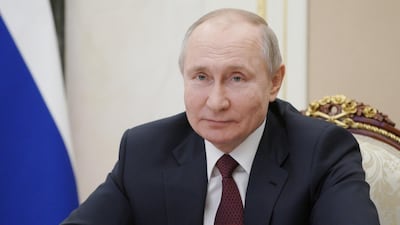Russian President Vladimir Putin said US President Joe Biden's remarks about him reflect the US's past and current problems after Mr Biden on Wednesday called him a killer.
In an interview, Mr Biden said "I do" when asked whether he thought the Russian president was a killer.
Mr Putin said on Thursday he was ready to hold public online talks with Mr Biden on Friday or Monday.
Mr Putin, speaking on state TV, said he was ready to discuss bilateral relations with the US as well as other issues such as regional conflicts.
After Mr Biden's comment, Russia on Wednesday said it was recalling its ambassador in Washington for consultations.
Asked about Mr Biden’s remarks during a video call with residents of Crimea marking the anniversary of its 2014 annexation from Ukraine, Mr Putin said that they reflected the United States’ own troubled past.
The Russian leader pointed at America's past history of slaughtering Native Americans and slavery, arguing that the painful legacy weighed on the United States.
“Otherwise where would the Black Lives Matter movement come from,” he said.
But Russia would still co-operate with the United States where it answers Moscow’s interests, he said.
Mr Putin’s spokesman Dmitry Peskov deplored what he called “very bad remarks by the US president” that made it clear that “he doesn’t want to normalise relations”.
"We will proceed accordingly," Mr Peskov said, noting that "there was nothing like that in history."
He would not answer questions about the possibility that Russia could go so far as to end diplomatic ties with the US.
Konstantin Kosachev, a deputy speaker of the Russian parliament’s upper house, said Mr Biden’s “boorish statement” was a watershed.
“Such assessments are inadmissible for a statesman of his rank,” Mr Kosachev said. “Such statements are unacceptable under any circumstances. They inevitably lead to a sharp exacerbation of our bilateral ties.”
Mr Kosachev said that Russia's response would not be limited to recalling the Russian ambassador "if the American side fails to offer explanation and excuse". He did not elaborate on what other action the Kremlin may take.
While announcing the decision to recall the Russian ambassador in Washington, Russian Foreign Ministry spokeswoman Maria Zakharova blamed the US for bringing bilateral ties to a “dead end”. “We are interested in preventing their irreversible degradation, if the Americans are aware of the associated risks,” she said.
Commenting on the Russian move on Wednesday, White House spokeswoman Jen Psaki emphasised that “we will be direct, we will speak out on areas where we have concerns, and it will certainly be, as the president said last night – certainly, the Russians will be held accountable for the actions that they have taken”.
The exchange of tough statements came on the heels of a declassified report from the US national intelligence director’s office that finds Mr Putin authorised influence operations to help Donald Trump in last November’s presidential election.
“[Putin] will pay a price,” Mr Biden said in the interview, asked about the declassified report.
Russia's relations with the US and the European Union plunged to post-Cold War lows after Moscow's 2014 annexation of Ukraine's Crimean Peninsula, election meddling, hacking attacks and, most recently, the jailing of Russia's opposition leader Alexei Navalny after he had been poisoned, which he blamed on the Kremlin. The Russian authorities rejected the accusations.

